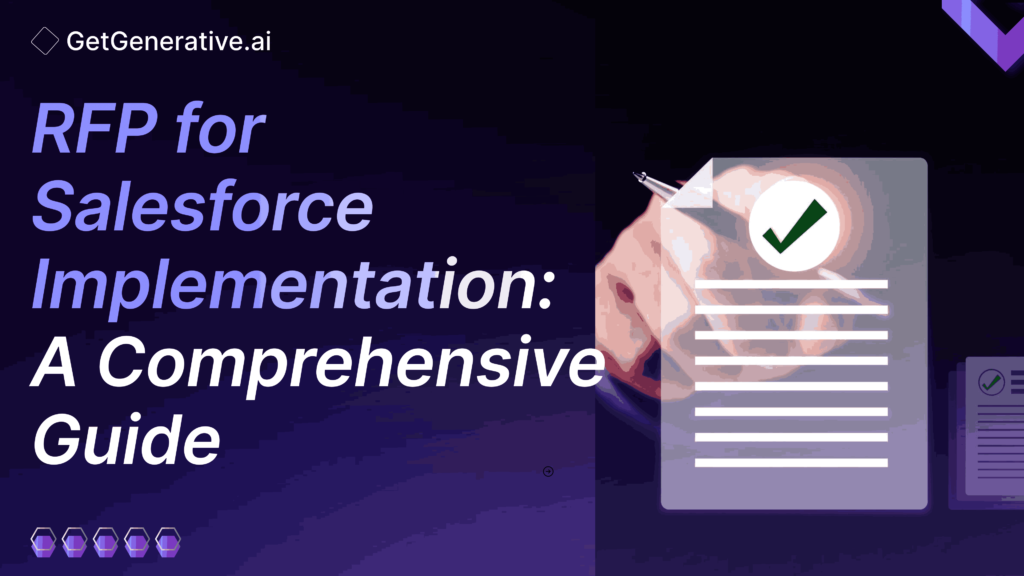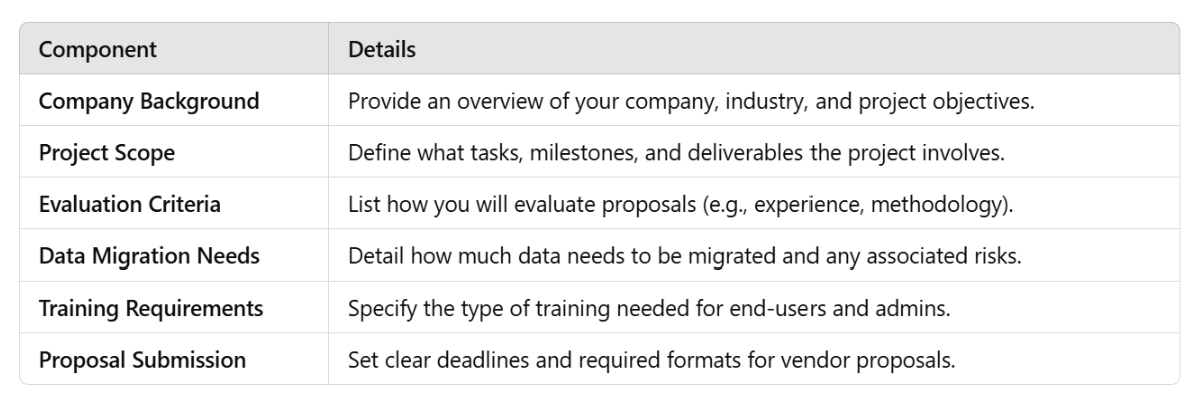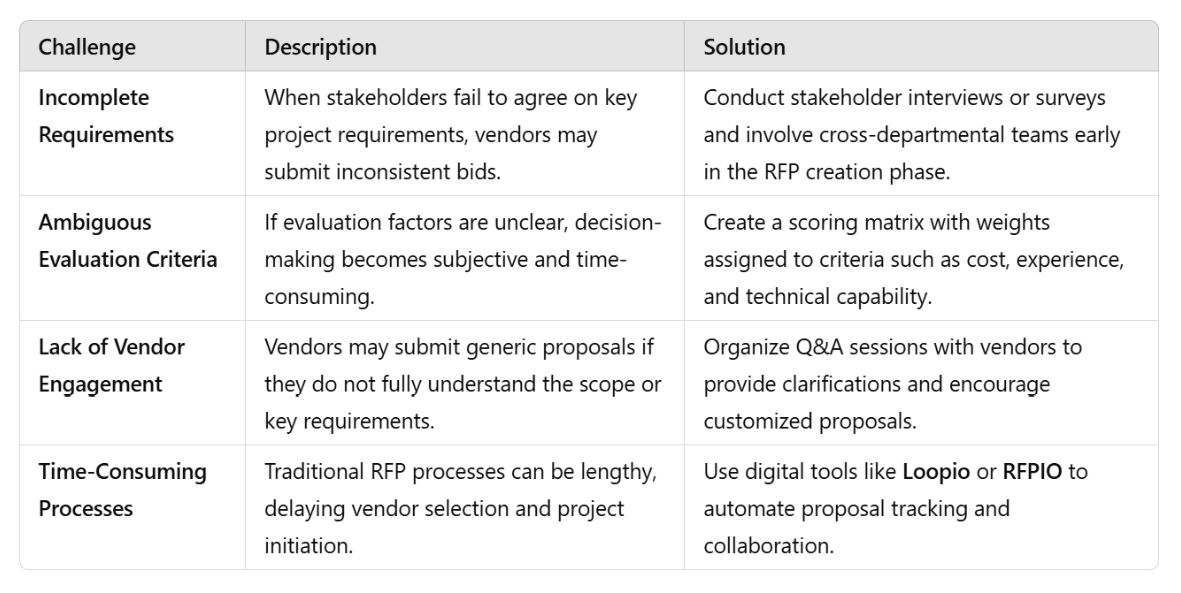RFP for Salesforce Implementation: Crafting a Winning Strategy
When considering a Salesforce implementation for your organization, creating a well-crafted Request for Proposal (RFP) is essential. An RFP allows you to clearly define your requirements, expectations, and project scope, enabling potential implementation partners to provide targeted proposals.
Did You Know? According to a report by Grand View Research, the global Customer Relationship Management (CRM) market size was valued at USD 65.69 billion in 2023 and is expected to expand at a compound annual growth rate (CAGR) of 13.9% from 2024 to 2030. As a CRM market leader, Salesforce has a significant share in this growth. A study by IDC found that Salesforce and its ecosystem of partners will create 9.3 million new jobs and $1.6 trillion in new business revenues worldwide by 2026.
Considering these statistics, it’s clear that implementing Salesforce can have a substantial impact on your organization’s growth and success. This blog post will guide you through the process of creating an effective RFP for Salesforce implementation to help you find the right partner for your project.
What is an RFP for Salesforce implementation?
An RFP (Request for Proposal) for Salesforce implementation is a formal document outlining your organization’s specific requirements, goals, and expectations for implementing Salesforce CRM products, such as Sales Cloud, Service Cloud, or Marketing Cloud. It invites potential implementation partners to submit proposals detailing how they would approach your project, their expertise, and the associated costs.
A study by Nucleus Research found that Salesforce implementations can deliver an average return on investment (ROI) of $8.71 for every dollar spent. However, to achieve such results, selecting the right implementation partner is crucial—one who thoroughly understands your requirements and has the expertise to deliver a successful project.
Pro Tip: A well-prepared RFP helps you select the best partner by providing enough information for vendors to create proposals that are tailored to your business needs.
Step-by-Step Guide: How to Create an RFP for Salesforce Implementation
Creating an RFP for Salesforce implementation involves several key steps:
Define your project objectives and scope:
- Identify the specific Salesforce products or features you want to implement (e.g., Sales Cloud, Service Cloud, Marketing Cloud, or Einstein Analytics)
- Determine the departments and processes that will be impacted by the implementation
- Establish clear goals and desired outcomes for the project
Identify key stakeholders and gather their input:
- Involve decision-makers from various departments, such as sales, marketing, customer service, and IT
- Conduct interviews or surveys to understand their requirements, pain points, and expectations
- Incorporate their feedback into the RFP to ensure a comprehensive scope
Outline your current systems and processes:
- Describe your existing CRM system (if any) and other relevant software tools
- Detail your current sales, marketing, and customer service processes
- Identify areas where Salesforce can improve efficiency and productivity
Specify your Salesforce requirements and desired customizations:
- Define the specific features and functionalities you require from Salesforce
- Outline any necessary customizations, such as custom fields, workflows, or automations
- Describe your data migration needs, including the volume and complexity of data to be migrated
Establish project timelines and milestones:
- Set realistic deadlines for proposal submissions, partner selection, and project kickoff
- Define key milestones, such as discovery, configuration, testing, and go-live phases
- Include a tentative timeline for user training and adoption
Define evaluation criteria for assessing proposals:
- Determine the factors you will use to evaluate implementation partners, such as experience, expertise, methodology, and pricing
- Assign weights to each criterion based on their importance to your organization
- Include these evaluation criteria in the RFP to ensure transparency and fairness in the selection process
Check out this resource for further guidance: Salesforce RFP Template
Key Components of a Well-Structured Salesforce Implementation RFP
A well-structured Salesforce implementation RFP should include the following key components:
Company background and project overview:
- Brief description of your organization, including industry, size, and location
- Overview of the project, including objectives, goals, and expected outcomes
- Explanation of why you are considering a Salesforce implementation
Detailed Salesforce requirements and desired features:
- Specific Salesforce products or features to be implemented (e.g., Sales Cloud, Service Cloud, Marketing Cloud, or Einstein Analytics)
- Desired customizations, such as custom fields, workflows, or automations
- Specific integrations with existing systems or third-party tools
- Reporting and analytics requirements
Integration and data migration needs:
- Description of current systems and data sources to be integrated with Salesforce
- Volume and complexity of data to be migrated
- Data cleansing and transformation requirements
- Specific data migration tools or methodologies to be used
User training and support expectations:
- Number of users to be trained and their roles (e.g., sales reps, managers, administrators)
- Preferred training methods (e.g., on-site, virtual, self-paced)
- Ongoing support and maintenance requirements
- Service level agreements (SLAs) for support and issue resolution
Project timeline and deliverables:
- Desired project start and end dates
- Key milestones and deliverables for each project phase (e.g., discovery, configuration, testing, go-live)
- Expectations for project status updates and communication
Proposal evaluation criteria:
- Specific criteria for evaluating implementation partner proposals (e.g., experience, expertise, methodology, pricing)
- Weighting or importance of each criterion
- Required proposal format and submission instructions
Tips for Evaluating Salesforce Implementation Proposals
Once you have received proposals from potential Salesforce implementation partners, evaluating them thoroughly is crucial to selecting the best fit for your organization. Here’s how to assess the responses:
Assess the implementation partner’s Salesforce expertise and certifications:
- Look for partners with a proven track record of successful Salesforce implementations in your industry
- Verify the number and type of Salesforce certifications held by their team members (e.g., Salesforce Certified Administrator, Salesforce Certified Sales Cloud Consultant, Salesforce Certified Technical Architect)
- Evaluate their experience with the specific Salesforce products and features you plan to implement
Evaluate their proposed solution’s alignment with your requirements:
- Assess how well the partner’s proposed solution addresses your organization’s specific needs and goals
- Verify that the proposal covers all the key components and requirements outlined in your RFP
- Look for partners who offer creative solutions and best practices based on their Salesforce expertise
Consider their project management approach and methodology:
- Evaluate the partner’s proposed project management methodology (e.g., Agile, Waterfall) and its suitability for your organization
- Assess their communication and reporting plans to ensure transparency and regular updates throughout the project
- Verify that their approach includes a clear plan for testing, quality assurance, and user acceptance
Review client references and case studies:
- Request and contact client references to gather feedback on the partner’s performance, communication, and ability to deliver projects on time and within budget
- Review case studies or success stories that demonstrate the partner’s experience and success with similar Salesforce implementations
- Assess the partner’s ability to address challenges and provide effective solutions based on their previous work
Analyze their pricing structure and value for money:
- Compare the partner’s pricing proposal to your budget and the other proposals received
- Evaluate the level of detail and transparency in their pricing structure
- Consider the value-added services, such as ongoing support, training, and optimization, included in their proposal
Learn more about evaluating proposals: RFP-RFQ-RFI Guide
How to Assess Salesforce Implementation Proposals?
After evaluating your Salesforce implementation RFP responses, you’ll need to assess the proposals in detail to make a final decision. Here’s how to assess the proposals:
Score proposals based on predefined evaluation criteria:
- Use a scoring matrix or rubric that aligns with the evaluation criteria outlined in your RFP
- Assign scores to each criterion for each proposal based on how well they meet your requirements
- Involve key stakeholders in the scoring process to ensure diverse perspectives and buy-in
Conduct presentations or interviews with shortlisted implementation partners:
- Invite the top-scoring implementation partners to present their proposals in person or via video conference
- Prepare a list of questions to ask during the presentations, focusing on their approach, expertise, and ability to meet your specific needs
- Allow time for Q&A to clarify any aspects of their proposal or approach
Verify the partner’s Salesforce expertise and certifications:
- Request proof of the partner’s Salesforce certifications and expertise, such as certification badges or verification links
- Confirm the experience and qualifications of the specific team members who will be working on your project
- Reach out to Salesforce account executives or partner managers to validate the partner’s standing and reputation
Assess their ability to meet your project timeline and budget:
- Review the partner’s proposed project timeline and compare it to your desired timeline
- Evaluate their ability to deliver the project within your budget constraints
- Consider any potential risks or dependencies that could impact the timeline or budget
Consider their approach to change management and user adoption:
- Evaluate the partner’s plan for managing change and ensuring user adoption of the new Salesforce system
- Look for partners who offer comprehensive training and support to help your users transition smoothly
- Assess their approach to measuring and optimizing user adoption over time
Negotiate terms and conditions:
- Engage in negotiations with your preferred implementation partner to finalize the scope of work, timeline, and pricing
- Ensure that the contract includes clear deliverables, milestones, and acceptance criteria
- Define the roles and responsibilities of both parties, as well as any contingencies or provisions for change requests
Avoid These Common Mistakes When Preparing an RFP
Pro Tip: To avoid missing key components, consider using an RFP template to streamline the process.
Is It Necessary to Include a Budget Range?
Including a budget range in your RFP for Salesforce implementation can help potential partners tailor their proposals to your financial constraints. However, if you prefer to assess proposals based on value rather than cost, you may omit budget details and request that partners provide their best recommendations.
Is it Necessary to Specify Technical Requirements in a Salesforce RFP?
Yes, specifying technical requirements in your RFP for Salesforce implementation is crucial. This includes details about your current systems, desired integrations, data migration needs, and any specific customizations or features you require. Providing clear technical requirements ensures that implementation partners can propose solutions that align with your needs.
Leveraging Salesforce AI for Predictive Analytics in 2025
Predictive analytics leverages historical data, machine learning, and AI to forecast future outcomes. Salesforce’s integration of AI capabilities, such as Einstein Prediction Builder and Analytics Studio, enables businesses to make data-driven decisions, enhancing operational efficiency and customer satisfaction.
Importance of Predictive Analytics
Improves decision-making through accurate forecasting. Identifies customer behavior patterns for targeted marketing. Enhances operational efficiency by predicting inventory needs. Mitigates risks by analyzing trends and anomalies.
Key Features of Salesforce Predictive Analytics
Einstein Prediction Builder creates tailored predictions for business-specific needs. Analytics Studio visualizes trends and offers actionable insights. Integration with Data Cloud centralizes customer data for comprehensive analysis. AI-driven insights help identify churn risks, sales opportunities, and revenue trends.
Industry Applications
Retail uses predictive analytics to forecast demand and personalize promotions. Healthcare predicts patient needs and optimizes resource allocation. Financial services assess credit risks and detect fraud. Manufacturing predicts equipment maintenance schedules to minimize downtime.
Case Studies: Real Success Stories with Well-Prepared RFPs
Case Study 1: A Tech Company Accelerates Implementation with a Clear RFP
A large technology firm sought to implement Salesforce across multiple departments to unify its customer data and improve sales pipeline visibility. By preparing a comprehensive RFP that outlined their objectives, requirements, and evaluation criteria, the company:
- Attracted vendors with relevant experience in multi-department implementations.
- Reduced the vendor evaluation process by 40%, thanks to clear proposal evaluation matrices.
- Selected a partner that delivered the project three months ahead of schedule with a 25% lower budget than anticipated.
Key Takeaway: Detailed requirements and realistic timelines can significantly reduce project delays and improve overall outcomes.
Case Study 2: A Retail Chain Improves Efficiency with an AI-Powered RFP Process
A national retail chain issued an RFP to implement Salesforce Service Cloud for its customer service operations. The RFP included specifics on data migration, workflow automations, and multi-channel integration. The company used AI tools like GetGenerative.ai to streamline responses and track proposals.
- The selected vendor proposed innovative chatbot-driven support, which improved response time by 50%.
- Customer satisfaction scores increased by 30% within the first six months of deployment.
Key Takeaway: Using AI-powered tools can enhance the accuracy and speed of the vendor selection process.
Challenges in RFP Management and How to Overcome Them
Even with a clear structure, managing RFPs can present challenges that, if not addressed, may lead to project delays or poor vendor selection.
Pro Tip: Continuous feedback and open communication with vendors can reduce misunderstandings and improve response quality.
Post-RFP Evaluation: What Comes Next?
After selecting the right vendor, the post-RFP phase is critical to ensuring the successful execution of the project. Here’s what to do:
1. Finalize Contracts and Terms
- Ensure that all deliverables, timelines, and key performance indicators (KPIs) are clearly outlined.
- Negotiate payment terms, milestones, and penalties for missed deadlines.
Tip: Review the vendor’s proposed contract terms carefully, and don’t hesitate to involve legal counsel if necessary.
2. Set Clear Communication Channels
- Identify key contacts from both your organization and the vendor’s side.
- Establish regular check-ins to monitor progress and address issues promptly.
3. Create a Project Kickoff Plan
- Set up an initial meeting to align stakeholders, discuss roles and responsibilities, and go over key milestones.
- Define success metrics, such as improvements in sales productivity or customer satisfaction.
4. Monitor and Manage Performance
- Track progress against milestones using project management tools.
- Conduct periodic reviews to assess whether the project is on track and within budget.
5. Plan for Post-Implementation Support
- Ensure that the vendor provides post-launch support, such as user training and system maintenance.
- Define escalation procedures for any issues that may arise.
Pro Tip: Create a post-implementation checklist to evaluate success and identify areas for improvement.
Conclusion: Master Your RFP for Salesforce Implementation
Creating a comprehensive RFP for Salesforce implementation is key to finding the right partner and ensuring a successful project. By defining your requirements, establishing evaluation criteria, and carefully assessing proposals, you can select an implementation partner who will help you achieve your Salesforce objectives.
Are you ready to elevate your proposal game? Look no further than GetGenerative.ai. Our innovative platform streamlines the proposal creation process, enabling you to craft impressive, persuasive proposals in record time. Say goodbye to tedious, time-consuming proposal writing and hello to increased efficiency and productivity.
With GetGenerative.ai, you’ll have more time to dedicate to what truly matters: delivering outstanding results for your clients. Don’t wait—sign up with GetGenerative.ai today and unlock your full potential as a Salesforce consultant!
Frequently Asked Questions (FAQs)
1. How long should an RFP for Salesforce implementation be?
An RFP for Salesforce implementation should be thorough but concise. It typically ranges from 10 to 20 pages, depending on the complexity of your project and requirements.
2. What is the typical timeline for a Salesforce implementation project?
The timeline for a Salesforce implementation project varies based on the project’s scope and complexity. Still, it typically ranges from 3 to 6 months for small to medium-sized projects and 6 to 12 months for larger, more complex projects.
3. How do I ensure data security during a Salesforce implementation?
To ensure data security during a Salesforce implementation, work with your implementation partner to establish data governance policies, implement role-based access controls, and follow Salesforce’s security best practices, such as using multi-factor authentication and monitoring user activity.







